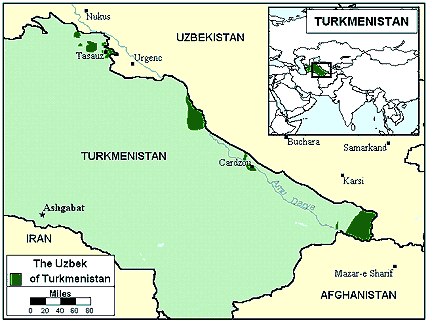|
|
Prayer Profile
The Uzbek of Turkmenistan
![[IMAGE]](../images/0137.jpg) The Uzbek are a mixture of Turkic tribes that have many Mongolian and Iranian traits. The term Uzbek, meaning "master of himself," accurately describes the people. Their love of freedom and sense of restlessness have often caused conflicts with the conquerors who have invaded their homeland, the west central Asian region known as Turkestan, throughout the centuries.
The Uzbek are a mixture of Turkic tribes that have many Mongolian and Iranian traits. The term Uzbek, meaning "master of himself," accurately describes the people. Their love of freedom and sense of restlessness have often caused conflicts with the conquerors who have invaded their homeland, the west central Asian region known as Turkestan, throughout the centuries.
Conflicts in Turkestan began with the invasion of Alexander the Great in the fourth century, followed by the Arabs and Turks in the seventh and eighth centuries, and the Mongols, under Genghis Khan, in the thirteenth century. Tamerlane's conquest in the 1300's brought the last, and perhaps finest, period of culture and learning to the Uzbek.
Turkestan entered a long period of decline in the 1500's. By the time the Russians invaded the area between 1860 and the mid-1880's, Turkestan had broken into several warring principalities. It was then that many Uzbek dispersed throughout Central Asia.
What Are Their Lives Like?
The nearly 370,000 Uzbek of Turkmenistan primarily live in the cities, mainly concentrated in the Tashauz and Charjow regions. In the rural areas, the Uzbek are often shepherds who live close to their flocks of sheep and herds of horses, cattle, camels, and goats.
Although farming and sheep herding are their traditional occupations, many of the modern Uzbek in Turkmenistan make a living as merchants and craftsmen. The latter are usually skillful bazaar artisans (silver and goldsmiths, leather workers, woodcarvers, and rug makers).
Most of the Uzbek, especially those in urban areas, have adopted European style clothing; some, however, still wear traditional dress. Uzbek women do much of the household work and handle many of the less skilled and manual jobs. They are often segregated from the men.
Although most of the Central Asian countries accepted Russian authority reluctantly, they became some of the most progressive of the soviet republics. During the 1930's, many peasant farmers were organized into large collective state farms. With the introduction of modern mechanized farming equipment, the farms soon became intensively cultivated. During World War II, some of these republics became the main arsenals for the Soviet war effort because it supplied the front with much needed food and equipment.
At the time under Soviet rule, the Uzbek faced intense pressure to "become Russian." Despite the forced collective farming and anti-religious campaigns, the Uzbek retain many elements of the classic Central Asian culture.
Uzbeki is a vital language for all of the former soviet central Asia. It is the language most understood and spoken by the greatest number of people. Uzbeki was transcribed into Arabic script in 1923, into Latin script in 1927, and replaced by Cyrillic in 1940.
What Are Their Beliefs?
About eighty percent of the Uzbek are Sunni Muslims. There are also a few Shi'ite Muslims and various Sufi orders. The role of the numerous holy places of pilgrimage is less significant than in other territories of Central Asia where the tribal structures are still strong.
Pre-Islamic shamanism (belief that there is an unseen world of many gods, demons, and ancestral sprits) survives in an Islamic form. Today the shaman (priest or medicine man) is a practicing Muslim who combines shamanistic trances with reciting Islamic prayers, fasts, and other Islamic practices.
What Are Their Needs?
Ministry among Muslims is difficult. Although three missions agencies are working with the Uzbek, there are no known Christians among the people. Turkmenistan desperately needs prayer and additional workers.
Although the complete Bible is not yet available in Ubeki, the New Testament has been completed. Additional evangelistic materials are needed to effectively reach them with the Gospel.
Prayer Points
- Take authority over the spiritual principalities and powers that are keeping the Uzbek bound.
- Ask the Holy Spirit to soften the hearts of Uzbek Muslims towards Christians.
- Ask God to grant wisdom and favor to missions agencies that are targeting the Uzbek.
- Pray for effectiveness of the Jesus film and Christian Uzbeki language broadcasts.
- Pray that God will raise up qualified linguists to continue translating the Word of God into the Uzbeki language.
- Ask the Lord to call additional people who are willing to share the Gospel in Turkmenistan.
- Ask the Lord to raise up missionaries who can effectively minister the Gospel to the Muslims and other Uzbek.
- Pray for God to raise up strong local churches among the Uzbek.

Statistics
Latest estimates from the World Evangelization Research Center.
THE PEOPLE
- People name: Uzbek
- Country: Turkmenistan
- Their language: Uzbeki
- Population:
- Largest religion:
- Christians: 0%
- Church members: 0
- Scriptures in their own language: New Testament
- Jesus Film in their own language: Available
- Christian broadcasts in their own language: Available
- Mission agencies working among this people: 3
- Persons who have heard the Gospel: 162,500 (44%)
- Persons who have never heard the Gospel: 206,700 (56%)
THEIR COUNTRY
- Country: Turkmenistan
- Population:
- Major peoples in size order:
- Major religions:
- Number of denominations: 12
© Copyright 1997
Bethany World Prayer Center
This profile may be copied and distributed without obtaining permission
as long as it is not altered, bound, published
or used for profit purposes.
![[HOME BUTTON]](../graphics/home.jpg)
![[CALENDAR BUTTON]](../graphics/calico.jpg)
![[LIST BUTTON]](../graphics/listico.jpg)
[Home]
[Calendar]
[Country List]
|